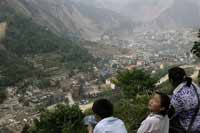Death toll of Chinese earthquale passes 55,000
Experts warily monitored dozens of lakes formed during the upheaveal of China's earthquake to see if aftershocks could unleash flooding, as the death toll from the quake rose Friday to more than 55,000.

Hardest-hit Sichuan province also announced plans to rebuild within three years, as it copes with the aftermath of the May 12 temblor that left some 5 million homeless.
Nearly three dozen new lakes were formed after the quake threw down debris that formed barriers across rivers, with water pooling behind them. Those barriers could collapse, unleashing flooding, so they are being monitored by experts - including some dropped in by parachute, said Zhu Bing, deputy director of the Sichuan water resources bureau.
"In the short-term, we don't think there's any danger," he told reporters in Beijing. "But after all, it's in the disaster area, with aftershocks. If there is a strong aftershock or a strong thunderstorm, there is the danger of collapse."
The death toll in Sichuan alone rose to 55,239, with 24,949 people missing, said Vice Governor Li Chengyun. Less than 1,000 people have been confirmed dead in other provinces.
The province aims to rebuild roads and cities within three years, Li said in Beijing.
In the tiny town of Bailu, about a two-hour drive from the Sichuan provincial capital of Chengdu, the air was filled Friday with smoke from makeshift brick wood-burning stoves heating large black woks filled with string beans or rice porridge for lunch.
Red banners across the main street in the quake-flattened town nestled between two mountains said, "There is no difficulty that the heroic Chinese people cannot defeat." One long stretch of road was lined with wooden furniture moved out of collapsed homes, and tents were in great demand.
Most of the town's banners urged residents to maintain proper hygiene and prevent diseases.
"It's been a big disaster but the government has been doing a good job and I think the rebuilding work can be done in three years," said Zhang Min, 36, who works for a brick-making company.
Liu Qiang, a teacher at a medical college in Hubei province who came to aid quake victims, said the lack of clean water was causing health problems.
"People are developing rashes and wounds are becoming infected because they're using dirty water," Liu said. "Colds and fevers are also common."
As many as 9,000 injured will be transported to other provinces, Vice Governor Li said, as the large casualty toll has overwhelmed local hospitals in Sichuan. He said more psychologists were also needed to help survivors cope with the tragedy, especially children orphaned by the quake along with students who saw many classmates killed in collapsed schools.
No survivors have been found buried in rubble since Wednesday, but Li said rescuers have not abandoned the search.
"We will not give up on trying to save people," Li said.
Six pandas were moved Friday from the damaged panda-breeding base in Wolong near the epicenter because of food shortages, the official Xinhua News Agency said.
"There is enough water now, but food is still a major problem. The pandas are in urgent need of bamboo and apples," Xiong Beirong, an official with the Sichuan provincial forestry bureau, told the agency.
Two pandas missing since the quake have still not been located.
The Olympics torch relay ran through Shanghai after a ceremony that began with a minute of silence in People's Square to honor quake victims.
"Now the Sichuan people are suffering from the earthquake and we're lucky to be here. I hope we can all show respect for the Sichuan people, to show we are brave and also show our thanks to the government for their help," said Dennis Jin, a worker with the Shanghai branch of television maker Sichuan Changhong who is a native of the province.
Subscribe to Pravda.Ru Telegram channel, Facebook, RSS!

